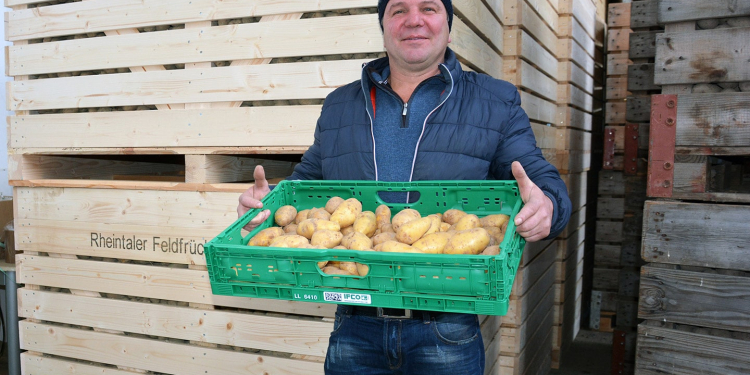Austrian cooperative Rheintaler Feldfrüchte about the new storage capacity

Twelve months a year, fresh, regional potatoes, onions and other open ground products: That is the ambitious goal of the Austrian cooperative Rheintaler Feldfrüchte. To achieve this, the company, founded in 2017, has set up a brand new storage hall with a total capacity of 750,000 tons in the Vorarlberg region. In the near future, this innovation should lead to new sales markets being tapped, says company manager Sebastian Allgäuer.
The trading company was founded just three years ago when the two growers Sebastian Allgäuer and Kilian Schatzmann decided to join forces and market their regional products as a cooperative. Allgäuer: “At that time my potatoes were always sold out before Christmas.”
Over the past few years, the company has succeeded in expanding its portfolio step by step. Customers in the wholesale and retail segments now also have a choice of regional onions and celery. “Celery is our newest hobby horse, and we are one of the few suppliers here for miles around. This year we will market a total yield of 150 tons.” This volume can be expanded in the coming years, as the new storage hall can accommodate 250 tons of celery.

Constant sales
Despite Corona, Rheintaler Feldfrüchte has for the time being spared major sales losses. However, the consequences of the corona crisis have also been noticed in the Vorarlberg region. “The school canteens were closed for a while, but in general we had a constant sales volume so far. There are certainly other trade segments that have been hit harder than we are”, Allgäuer looks back on an eventful time.
Also at the product level, Corona has had only a minimal impact on the market. “We only supply ware potatoes and no industrial value. For table potatoes the sales but also the price have largely remained stable. Only large sizes are difficult to trade, although we can always dispose of these at retirement homes and institutions.”
High appreciation for regional production
Apart from supplying regional institutions and canteens, the company has close ties with the Austrian retail chain Spar. “During the first virus wave in the spring, we were able to increase our sales in this segment fivefold. This was due to the difficult transports from abroad, which meant that only a small amount of imported product was received.”

It currently appears that this exponential sales growth has leveled off. “In my opinion, we can only determine afterwards whether the crisis has actually led to a higher appreciation of regional production among consumers.”
New market niches
Despite the difficult market developments, the management of the young company looks to the future with confidence. New extensions are even being considered. “We are considering including a number of more products in our portfolio. Currently, for example, we only grow and trade yellow onions, although we also see a high demand for regional red onions. This could be an interesting niche for us. “






